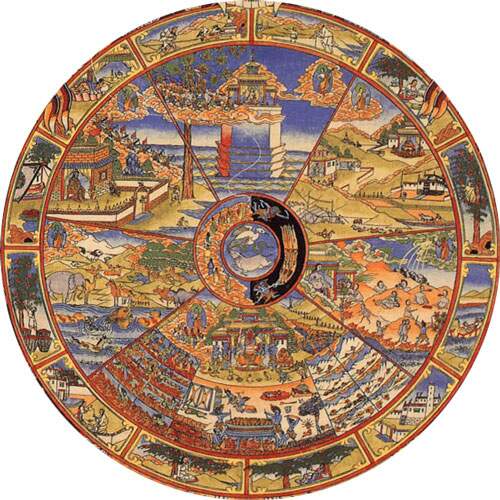
It’s strange to talk to friends, especially old friends, about meditation, even when they ask about it. It’s been so helpful to me, and I’m glad to share my experience when it might help someone else, but I’m also by nature averse to proselytizing. I really don’t ever want to hearken back to the fundamentalist kid me on church outings in public parks, interrupting happy picnics to hand people Jack Chick tracts about how their life is all wrong.
And also, there’s a part of me that still feels answerable to the person I have seen myself as being most of my life, the person attached to pessimism and cynicism and depression and to, on occasion, throwing my entire self, directing all of my energy and passion, into raging against injustice. I have conversations with that person in my head all the time. Which is complicated, because that person was a product of a lot of influences and experiences. That person was inconsistent and always changing, too.
Buddhism (that’s the path I’ve been heading down, after a lifetime of secretly feeling scornful of Westerners who called themselves Buddhist) holds that there is no such thing as a cohesive self, that second to second we are in flux, always transforming, and that if we allow ourselves to observe our thoughts and feelings in meditation without being caught up in them we can see how illusory our sense of a fixed identity really is. We can see how our narratives about ourselves and life and other people are actually much more complicated (and in my case, much more embarrassing and immature) than we think they are.
For me, in the moment, meditation is usually the opposite of bliss. The kind I do doesn’t focus on clearing the mind but on letting the thoughts and feelings be there without following them, letting them exist while returning over and over again to my breath. Sitting with myself like this can be and often is excruciatingly uncomfortable, but cumulatively it makes me feel better: less anxious, less depressed, less manic, less detached, and less angry, though at any given time I might be experiencing all of these things. My practice is especially valuable to me right now, after the loss of my friend Nelson and with many people I Iove going through very hard stuff.
Pema Chödrön writes of difficult feelings — and joyous feelings — as clouds overhead. They’re there, and they affect us, and there’s no point in chasing them as they move through our lives, and there’s no point in fighting them or trying to push them away, either. They’re ever-present and inevitable as the weather. It feels better when we accept that, is the idea. It feels better when we see our feelings for what they are, when we know them intimately and embrace the whole confusing swirl.
One of my favorite parts of my favorite book of hers, Start Where You Are, talks about how the beginner to meditation wants to master everything at once, wants to change immediately and irrevocably into a better self. But, she says, “the truth sinks in like rain into very hard earth. The rain is very gentle, and we soften up slowly at our own speed. But when that happens, something has fundamentally changed in us. That hard earth has softened. It doesn’t seem to happen by trying to get to it or capture it. It happens by letting go.”